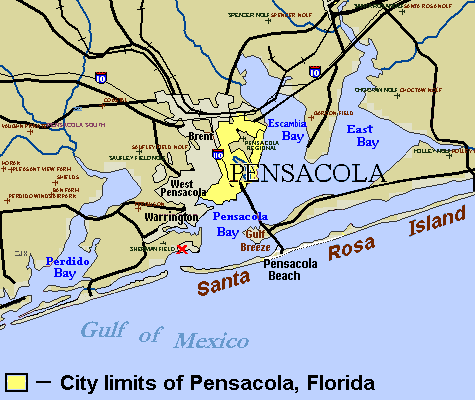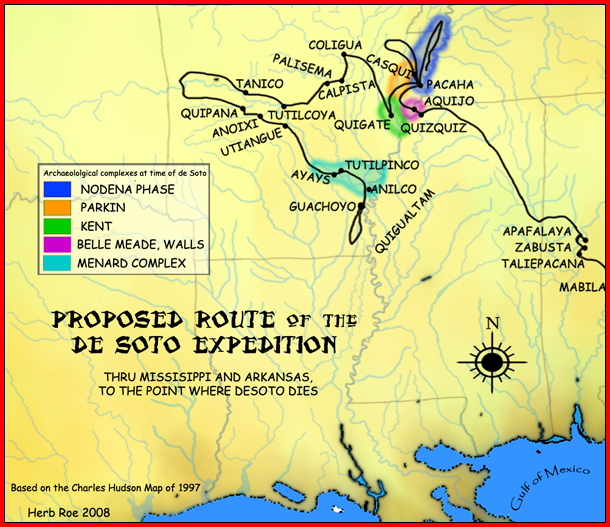|
Jean-Baptiste Bénard De La Harpe
Jean-Baptiste Bénard de la Harpe (4 February 1683 in Saint-Malo – 26 September 1765) was a French explorer who is credited with the discovery of Little Rock, Arkansas. He was the first known French explorer to set foot in the future state of Oklahoma. Explorations in Oklahoma In 1718, La Harpe left France, along with 40 men, and established a trading post in April 1719 on the Red River near what is now Texarkana, Texas. This was near the center of the Caddo Confederacy. La Harpe hoped to establish trade relationships with more distant and unknown Indian tribes and, thus, on 11 August 1718, he set off with 9 men, including 3 Caddo guides, and 22 horses loaded with trade goods to visit a Wichita village to the northwest. (This same year, another French explorer, Claude Charles Du Tisne also journeyed west to visit a different Wichita village in Kansas.) La Harpe followed the Red River upstream, probably to the vicinity of present-day Idabel, Oklahoma. He then turned no ... [...More Info...] [...Related Items...] OR: [Wikipedia] [Google] [Baidu] |
Saint-Malo
Saint-Malo (, , ; Gallo: ; ) is a historic French port in Ille-et-Vilaine, Brittany, on the English Channel coast. The walled city had a long history of piracy, earning much wealth from local extortion and overseas adventures. In 1944, the Allies heavily bombarded Saint-Malo, which was garrisoned by German troops. The city changed into a popular tourist centre, with a ferry terminal serving the Channel Islands of Jersey and Guernsey, as well as the Southern English settlements of Portsmouth, Hampshire and Poole, Dorset. The famous transatlantic single-handed yacht race Route du Rhum, which takes place every four years in November, is between Saint Malo and Pointe-à-Pitre in Guadeloupe. Population The population in 2017 was 46,097 – though this can increase to up to 300,000 in the summer tourist season. With the suburbs included, the metropolitan area's population is approximately 133,000 (2017). The population of the commune more than doubled in 1967 with the me ... [...More Info...] [...Related Items...] OR: [Wikipedia] [Google] [Baidu] |
Tawakoni
The Tawakoni (also Tahuacano and Tehuacana) are a Southern Plains Native American tribe, closely related to the Wichitas. They historically spoke a Wichita language of the Caddoan language family. Currently, they are enrolled in the Wichita and Affiliated Tribes, a federally recognized tribe."Wichita Memories: In the Beginning: 1540-1750." ''Wichita and Affiliated Tribes'' (retrieved 1 May 2010). History At the beginning of the 18th century, the Tawakoni lived in villages in what is now Oklahoma and . In his 1719 expedition, French explorer[...More Info...] [...Related Items...] OR: [Wikipedia] [Google] [Baidu] |
French City Founders
French (french: français(e), link=no) may refer to: * Something of, from, or related to France ** French language, which originated in France, and its various dialects and accents ** French people, a nation and ethnic group identified with France ** French cuisine, cooking traditions and practices Fortnite French places Arts and media * The French (band), a British rock band * "French" (episode), a live-action episode of ''The Super Mario Bros. Super Show!'' * ''Française'' (film), 2008 * French Stewart (born 1964), American actor Other uses * French (surname), a surname (including a list of people with the name) * French (tunic), a particular type of military jacket or tunic used in the Russian Empire and Soviet Union * French's, an American brand of mustard condiment * French catheter scale, a unit of measurement of diameter * French Defence, a chess opening * French kiss, a type of kiss involving the tongue See also * France (other) * Franch, a surname * Frenc ... [...More Info...] [...Related Items...] OR: [Wikipedia] [Google] [Baidu] |
People From Saint-Malo
A person ( : people) is a being that has certain capacities or attributes such as reason, morality, consciousness or self-consciousness, and being a part of a culturally established form of social relations such as kinship, ownership of property, or legal responsibility. The defining features of personhood and, consequently, what makes a person count as a person, differ widely among cultures and contexts. In addition to the question of personhood, of what makes a being count as a person to begin with, there are further questions about personal identity and self: both about what makes any particular person that particular person instead of another, and about what makes a person at one time the same person as they were or will be at another time despite any intervening changes. The plural form "people" is often used to refer to an entire nation or ethnic group (as in "a people"), and this was the original meaning of the word; it subsequently acquired its use as a plural form of p ... [...More Info...] [...Related Items...] OR: [Wikipedia] [Google] [Baidu] |
French Explorers Of North America
French (french: français(e), link=no) may refer to: * Something of, from, or related to France ** French language, which originated in France, and its various dialects and accents ** French people, a nation and ethnic group identified with France ** French cuisine, cooking traditions and practices Fortnite French places Arts and media * The French (band), a British rock band * "French" (episode), a live-action episode of ''The Super Mario Bros. Super Show!'' * ''Française'' (film), 2008 * French Stewart (born 1964), American actor Other uses * French (surname), a surname (including a list of people with the name) * French (tunic), a particular type of military jacket or tunic used in the Russian Empire and Soviet Union * French's, an American brand of mustard condiment * French catheter scale, a unit of measurement of diameter * French Defence, a chess opening * French kiss, a type of kiss involving the tongue See also * France (other) * Franch, a surname * Fre ... [...More Info...] [...Related Items...] OR: [Wikipedia] [Google] [Baidu] |
1765 Deaths
Events January–March * January 23 – Prince Joseph of Austria marries Princess Maria Josepha of Bavaria in Vienna. * January 29 – One week before his death, Mir Jafar, who had been enthroned as the Nawab of Bengal and ruler of the Bengali people with the support and protection of the British East India Company, abdicates in favor of his 18-year-old son, Najmuddin Ali Khan. * February 8 – **Frederick the Great, the King of Prussia, issues a decree abolishing the historic punishments against unmarried women in Germany for "sex crimes", particularly the ''Hurenstrafen'' (literally "whore shaming") practices of public humiliation. ** Isaac Barré, a member of the British House of Commons for Wycombe and a veteran of the French and Indian War in the British American colonies, coins the term "Sons of Liberty" in a rebuttal to Charles Townshend's derisive description of the American colonists during the introduction of the proposed Stamp Act. MP Barré ... [...More Info...] [...Related Items...] OR: [Wikipedia] [Google] [Baidu] |
1683 Births
Events January–March * January 5 – The Brandenburger—African Company, of the German state of Brandenburg, signs a treaty with representatives of the Ahanta tribe (in what is now Ghana), to establish the fort and settlement of Groß Friedrichsburg, in honor of Frederick William, Elector of Brandenburg Frederick William (german: Friedrich Wilhelm; 16 February 1620 – 29 April 1688) was Elector of Brandenburg and Duke of Prussia, thus ruler of Brandenburg-Prussia, from 1640 until his death in 1688. A member of the House of Hohenzollern, he is .... The location is later renamed Princes Town, also called Pokesu. * January 6 – The tragic opera ''Phaëton (Lully), Phaëton'', written by Jean-Baptiste Lully and Philippe Quinault, is premiered at the Palace of Versailles. * January 27 – Gove's Rebellion breaks out in the Province of New Hampshire in North America as a revolt against the Royal Governor, Edward Cranfield. Most of the participants, ... [...More Info...] [...Related Items...] OR: [Wikipedia] [Google] [Baidu] |
Pensacola, Florida
Pensacola () is the westernmost city in the Florida Panhandle, and the county seat and only incorporated city of Escambia County, Florida, United States. As of the 2020 United States census, the population was 54,312. Pensacola is the principal city of the Pensacola Metropolitan Area, which had an estimated 502,629 residents . Pensacola is the site of the first Spanish settlement within the borders of the continental United States in 1559, predating the establishment of St. Augustine by 6 years, although the settlement was abandoned due to a hurricane and not re-established until 1698. Pensacola is a seaport on Pensacola Bay, which is protected by the barrier island of Santa Rosa and connects to the Gulf of Mexico. A large United States Naval Air Station, the first in the United States, is located southwest of Pensacola near Warrington; it is the base of the Blue Angels flight demonstration team and the National Naval Aviation Museum. The main campus of the University ... [...More Info...] [...Related Items...] OR: [Wikipedia] [Google] [Baidu] |
Natural Steps, Arkansas
Natural Steps is an unincorporated area, unincorporated census-designated place in Pulaski County, Arkansas, United States. It is located northwest of Little Rock along the southern bank of the Arkansas River, on Arkansas Highway 300. Per the 2020 United States Census, 2020 census, the population was 413. Today, it is a small farming community with scattered businesses. Most of the natural steps, a geologic formation, still stand today and are used as a marker for river runners. The Natural Steps are not open to the public for viewing. Demographics 2020 census ''Note: the US Census treats Hispanic/Latino as an ethnic category. This table excludes Latinos from the racial categories and assigns them to a separate category. Hispanics/Latinos can be of any race.'' History The small town was named after "two perfectly parallel vertical walls of sandstone, twenty feet apart, [that] jut out from the disintegrated soft slates, in prominent conformity, descending steplike, fifty-o ... [...More Info...] [...Related Items...] OR: [Wikipedia] [Google] [Baidu] |
Quapaw
The Quapaw ( ; or Arkansas and Ugahxpa) people are a tribe of Native Americans in the United States, Native Americans that coalesced in what is known as the Midwest and Ohio Valley of the present-day United States. The Dhegiha Siouan-speaking tribe historically migrated from the Ohio Valley area to the west side of the Mississippi River in what is now the state of Arkansas; their name for themselves (or autonym) refers to this migration and to traveling downriver. The Quapaw are federally recognized tribes, federally recognized as the Quapaw Nation. The US federal government forcibly removed them to Indian Territory in 1834, and their tribal base has been in present-day Ottawa County, Oklahoma, Ottawa County in northeastern Oklahoma. The number of members enrolled in the tribe was 3,240 in 2011. Name Algonquian languages, Algonquian-speaking people called the Quapaw ''akansa''. French explorers and colonists learned this term from Algonquians and adapted it in French as ''Arcans ... [...More Info...] [...Related Items...] OR: [Wikipedia] [Google] [Baidu] |
Comanche
The Comanche or Nʉmʉnʉʉ ( com, Nʉmʉnʉʉ, "the people") are a Native American tribe from the Southern Plains of the present-day United States. Comanche people today belong to the federally recognized Comanche Nation, headquartered in Lawton, Oklahoma. The Comanche language is a Numic language of the Uto-Aztecan family. Originally, it was a Shoshoni dialect, but diverged and became a separate language. The Comanche were once part of the Shoshone people of the Great Basin. In the 18th and 19th centuries, Comanche lived in most of present-day northwestern Texas and adjacent areas in eastern New Mexico, southeastern Colorado, southwestern Kansas, and western Oklahoma. Spanish colonists and later Mexicans called their historical territory '' Comanchería''. During the 18th and 19th centuries, Comanche practiced a nomadic horse culture and hunted, particularly bison. They traded with neighboring Native American peoples, and Spanish, French, and American colonists a ... [...More Info...] [...Related Items...] OR: [Wikipedia] [Google] [Baidu] |


.jpg)
_1938.jpg)




